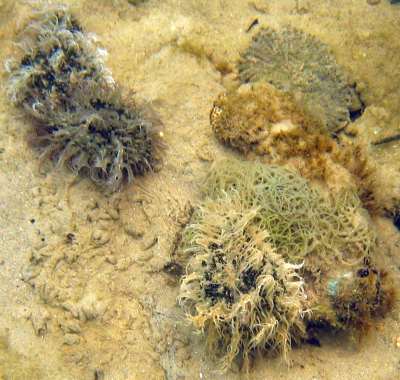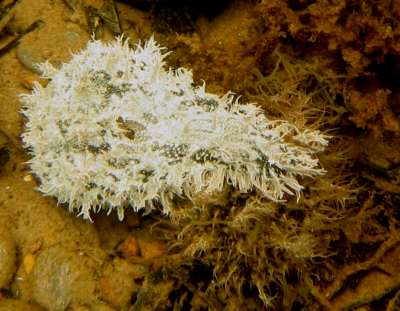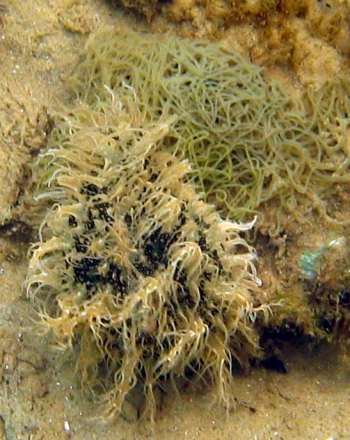Bursatella leachii aggregation in Trinidad, West Indies
August 25, 2005
From: Sherri Deaver


We just returned from a dive/snorkel trip to the NW coast of Trinidad (Caribbean) where we observed a brief but dense aggregation of Bursatella leachii. In six years of diving in this area we had never seen any B. leachii. On 26 July 2005 we saw a single individual. On 27 July we saw another single ragged sea hare at a different dive site. On 28 July we saw hundreds scattered widely in the shallows near shore. Distribution was as singles, in lines of 2-4 and mounds of 4-8 touching individuals. All were seen in the shallows (1-6 ft deep) in green water with sand and rubble bottoms, in the morning between 9-12 am and the water temperature averaged 82 degrees F. None were noted below 6 ft deep. The sea hares varied in color. White, pink, green, brown and greenish gray individuals were noted. On 2 Aug we found many B. leachii (20-40) in one small area at 2-4 ft. deep, but they were totally absent elsewhere. The concentrations noted on 28 July and 2 Aug. occurred at the same dive site. From 3 Aug. to 10 Aug. we dived several sites (including those where we found the concentration on 28 July/2Aug) and saw no sea hares anywhere. Judging from the information on the Sea Slug Forum, we assume we observed a mating aggregation. Does ragged sea hare mating usually occur in aggregation like this or is this unusual? Are they tied to lunar or other temporal cycles? If we ever see such an aggregation again, are there other factors we should be recording? Other photos and exact site locations (lat/longs) can be provided upon request.
Locality: Muck Dive sites on North shore of Trinidad, West Indies
Tropical Western Atlantic. Depth: 1-6 ft. Length: var., 4-7 inches. 26 July to 2 August 2005. fine sand and rubble, green water. Photographer: Sherri Deaver
Sherri Deaver
ksdeaver1@bresnan.net
Deaver, S, 2005 (Aug 25) Bursatella leachii aggregation in Trinidad, West Indies. [Message in] Sea Slug Forum. Australian Museum, Sydney. Available from http://www.seaslugforum.net/find/14624
Dear Sherri,
Thanks for this interesting observation. In both your photos there are typical tangled strings of eggs [see close-up alongside] which is certainly evidence they are mating and breeding, but whether we should call this a 'mating aggregation' I am not sure. In the Forum I have a Fact Sheet on mass mortality, which is I think part of the same cycle. My feeling is that sometimes, somewhere, large numbers of veligers settle out of the plankton and meet optimal environmental conditions. In a few weeks they quickly grow to maturity, mate and die. Death can be caused by old age, running out of food, or physical conditions such as excessive heat in shallow water or a bad storm - or a mixture of all these. I have mentioned seeing a huge aggregation like this of Bursatella leachii in New Zealand at a place I visited often. usually there would be a few Bursatella around but only once did I see an aggregation like this.
You ask if they usually aggregate like this for breeding. My feeling is that they don't 'aggregate' in the sense of all assembling in one place for the purpose of breeding. What we see is a whole population which settled out of the plankton as a large group and have all survived together through their life cycle. Other years only a few larvae will settle out of the plankton and in those cases mating will only occur if the few 'settlers' cross paths. The term 'cross paths' is very appropriate because many sea slugs seem to find their partners, and sometimes their prey, by following the mucus trails that are produced as they crawl along the substrate. As you will have read on the Forum these Sea Hare aggregations are a fascinating sight. I guess we can be fortunate they are all herbivorous. It would be a bit devastating if they were like the army ants of Africa and Sth America.
Best wishes,
Bill Rudman
Related messages
-
Bursatella leachii from Thailand
From: Nick Chapman, May 20, 2010 -
Bursatella leachii from sthn Queensland
From: Deb Aston, April 29, 2010 -
Sydney Sea hare ID
From: George Evatt, April 29, 2010 -
Re: Bursatella leachii in northeastern Spain
From: Bella Galil, March 23, 2010 -
Re: Bursatella leachii in northeastern Spain
From: Levent Cavas, March 23, 2010 -
Re: Bursatella leachii in northeastern Spain
From: Boris Weitzmann, March 19, 2010 -
Re: Bursatella leachii in northeastern Spain
From: Bella Galil, March 19, 2010 -
Probable Bursatella leachii from Japanese waters
From: Hiroyuki Tanaka, March 19, 2010 -
Bursatella leachii in northeastern Spain
From: Boris Weitzmann, January 29, 2010 -
Re: Bursatella leachii subspecies
From: Deng Yan Zhang, August 18, 2009 -
Bursatella leachii from New Zealand
From: Graham Bould, March 27, 2009 -
Re: Bursatella washing ashore East Florida
From: Ed Proffitt, December 12, 2008 -
Bursatella leachii & egg masses from Florida
From: Anne DuPont, November 21, 2008 -
Re: Bursatella leachii or Bursatella leachi?
From: Fabio Crocetta, November 21, 2008 -
Bursatella leachii or Bursatella leachi?
From: Fabio Crocetta, November 20, 2008 -
Re: Bursatella leachii from Florida - egg mass
From: Robert Bocik, November 18, 2008 -
Bursatella leachii from Mozambique
From: Valda Fraser, April 14, 2008 -
Re: Bursatella leachii from Lembeh Straits
From: Linda Rutherford, March 28, 2008 -
Bursatella leachii from Turkey
From: M. Kazak & L. Cavas, November 24, 2007 -
Bursatella washing ashore East Florida
From: Jon Moore, November 13, 2007 -
Bursatella leachii at Sanibel Island, Florida
From: Camilla Cheatham, November 12, 2007 -
Slug or not?
From: Gary Jackson, August 11, 2007 -
Sea Slug Mating Season? - Florida
From: Lisa Overstreet, July 19, 2007 -
Why so many sea slugs??
From: Dew Bakker, July 19, 2007 -
Sea slug sighting - Panama City Beach, Florida
From: James Ker, July 18, 2007 -
Re: Sea slugs washed ashore - Florida
From: Brian Mason, July 18, 2007 -
Sea Hares at Panama City Beach, Florida
From: Theresia Schwinghammer, July 17, 2007 -
Sea slugs washed ashore - Florida
From: Cheryl Bodden, July 16, 2007 -
What type is this?
From: Tom Johnson, July 16, 2007 -
Bursatella leachii
From: Doug Clark, June 28, 2007 -
Fremantle, Western Australia - many new sightings
From: Brent Murdoch, May 8, 2007 -
Bursatella leachii from Florida
From: Mark Javer, April 3, 2007 -
Bursatella in aquarium
From: Lori Blair, March 28, 2007 -
Bursatella leachii from Tampa, Florida
From: Angie Kuzminski, March 7, 2007 -
Bursatella leachii in Malaysian shrimp ponds
From: Huan Ung, February 28, 2007 -
Bursatella leachii from the Gulf coast of Florida
From: Sonnia Smith, January 24, 2007 -
Bursatella leachii from New South Wales
From: Keith Suddaby, January 16, 2007 -
Bursatella leachii subspecies
From: Augusto Medeiros, January 12, 2007 -
Re: Opisthobranch ova & capsules
From: Tony Fernando, November 16, 2006 -
Ragged Sea Hares on the beach
From: Cathy Zollo, August 28, 2006 -
Bursatella leachii from Guajira, Colombia
From: Adriana Aguirre, March 13, 2006 -
Bursatella leachii from Queensland
From: Alison Miller, March 7, 2006 -
Is the genus Barnardaclesia valid?
From: Carlo Magenta Cunha, February 2, 2006 -
Bursatella leachii from Gulf coast, Florida
From: Bryan Wanderlingh, August 30, 2005 -
Bursatella leachii from Florida
From: Bryan Wanderlingh, August 15, 2005 -
Bursatella leachii from Western Australia
From: Melvyn Lintern, July 11, 2005 -
Re: Albino form of Bursatella leachii
From: Dong Bum Koh, May 31, 2005 -
Another Bursatella leachii with eggs
From: Dong Bum Koh, May 31, 2005 -
Albino form of Bursatella leachii
From: Dong Bum Koh, May 27, 2005 -
Bursatella leachii - another colour form
From: Dong Bum Koh, May 27, 2005 -
Bursatella leachii - an aquarium tale
From: Lori Doyle, May 12, 2005 -
Bursatella leachii from Brazil
From: Vinicius Padula, February 16, 2005 -
Bursatella leachii? from Venezuela
From: Sylvia Grune, February 10, 2004 -
Bursatella leachii from Florida
From: Justin D, January 25, 2004 -
Bursatella leachii from Turkey
From: Umut Tural, January 13, 2004 -
Bursatella leachii defense
From: Brian, December 5, 2003 -
Re: Bursatella leachii from Madagascar
From: Franck Ducharne, August 21, 2003 -
Bursatella leachii from Madagascar
From: Franck Ducharne, August 18, 2003 -
Bursatella leachii from Tunisia
From: Anis, April 30, 2003 -
Bursatella leachii from Croatia
From: Adam Petrusek, April 10, 2003 -
Bursatella leachii from Florida
From: Linda Ianniello, March 3, 2003 -
Bursatella leachii from Florida - egg mass
From: Linda Ianniello , March 3, 2003 -
Bursatella leachii question
From: Cheri , February 12, 2003 -
Bursatella leachii from Chek Jawa, Singapore
From: Ria Tan, January 31, 2003 -
Bursatella leachii? from Florida
From: Jeremy Catches, September 12, 2002 -
Re: Bursatella? from Florida
From: Jan Clark, August 16, 2002 -
Bursatella leachii from eastern Australia
From: John Pogonoski, August 15, 2002 -
Bursatella? from Florida
From: Jan Clark, August 15, 2002 -
'shaggy dog' slug from Queensland
From: Caroline Deane-Caleffi, June 20, 2002 -
Estuarine Aplysiids in eastern Australia
From: Rachel Przeslawski, May 3, 2002 -
Re: Bursatella from New South Wales
From: Ian Mackey, March 30, 2002 -
Sea Slug? from Saratoga Bay NSW
From: Ian Mackey, March 25, 2002 -
Seahare bloom in Coffs Harbour marina, NSW
From: Hamish Malcolm, November 29, 2001 -
Bursatella leachii in New Zealand
From: John Buckeridge, October 22, 2001 -
Bursatella leachii - AP Biology exam
From: Stacy B., September 26, 2001 -
thank you!
From: JJ, August 25, 2001 -
Bursatella leachii from Colombia
From: Elianny Domínguez, May 30, 2001 -
Help on Bursatella
From: Josephine, April 12, 2001 -
Bursatella leachii - behaviour
From: James, March 11, 2001 -
Sea Hare deaths in Florida continue
From: Dana Mueller , March 9, 2001 -
Re: Sea Hares in Florida
From: Dana Mueller, February 28, 2001 -
Sea Hares in Florida (1)
From: Dana Mueller, February 27, 2001 -
Bursatella leachi plei in the Intertidal Zone?
From: Randi Bambach, October 19, 2000 -
I need information on Bursatella leachii
From: Sarah Dacres, September 3, 2000 -
Re: Bursatella from Florida
From: Douglas Anderson, August 5, 2000 -
Sea Slug/Nudibranch? from Florida
From: Douglas Anderson, July 31, 2000 -
Re: Bursatella leachii & sewage
From: Richard Willan , May 30, 2000 -
Re: Sea Hares & sewage in Auckland, NZ
From: John Buckeridge, May 27, 2000 -
Re: Sea Hares & sewage in Auckland, NZ
From: Joel Cayford, May 27, 2000 -
Sea Hare that lives on sewage?
From: Amelia Wong, May 24, 2000 -
Sea Hares at North Shore City, New Zealand
From: Joel Cayford, May 16, 2000 -
Question about Bursatella leachii
From: Emily Driesman, May 11, 2000 -
Frilled Sea Hare in Florida
From: Michelle van Deventer, February 28, 2000 -
Bursatella from Colombia
From: Phanor Montoya, February 16, 2000 -
Information on Bursatella leachii
From: Dana Rygwelski, September 28, 1999 -
What shall we feed our dear little sea hare?
From: Maggie Berry, August 28, 1999 -
Sea Slugs from Biscayne Bay, Florida
From: Luis, April 5, 1999 -
Re: Spatial Distribution of Bursatella leachii
From: Clare Kennedy, February 4, 1999 -
Spatial Distribution of Bursatella leachii
From: Ment Nguyen, January 23, 1999 -
Re: nudibranch in my aquarium
From: Rob See, January 8, 1999 -
Re: Re: nudibranch in my aquarium
From: Rob See, January 8, 1999 -
Re: Bursatella in prawn ponds
From: Tom Capo , December 8, 1998 -
Re: Bursatella in prawn ponds
From: Doug Pearson, December 7, 1998 -
Bursatella leachii in prawn ponds
From: Doug Pearson, December 6, 1998 -
Behaviour in Bursatella
From: Leah Wiesenfeld, July 27, 1998
